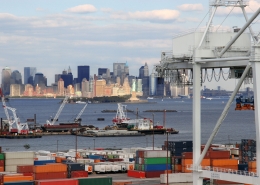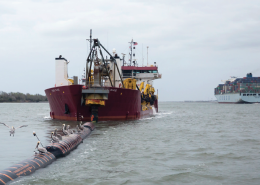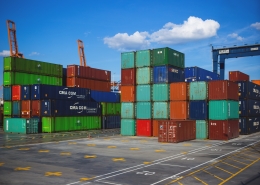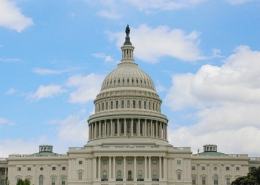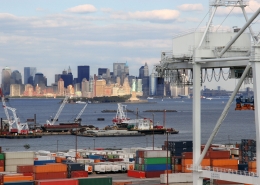Transit agencies across the U.S. are grappling with daunting operating budget shortfalls caused by the depletion of COVID-19 federal relief funds, rising operating costs, and reduced fare revenues.
In the Chicago area, transit agencies face an annual shortfall of approximately $730 million starting in 2026. On October 11, the region (with Eno’s help) took an important step towards addressing this fiscal cliff.
The Illinois state legislature recognizes that a robust transit system is critical to the success of the Chicago region, its economy, health, and environment – and that big, bold solutions are needed to secure the system’s financial viability. That is why, last year, the legislature asked the region’s metropolitan planning organization, Chicago Metropolitan Agency for Planning (CMAP) to develop a set of legislative recommendations that would “ensure the long-term financial viability of a comprehensive and coordinated regional public transportation system that moves people safely, securely, cleanly, and efficiently and supports and fosters efficient land use.”
After bringing in Eno to help identify and evaluate options, CMAP approved a Plan of Action last week. Rob Puentes, Eno’s president, said it was “extraordinary effort” because of CMAP’s consensus-building process. Even though the plan includes many controversial items relating to governance and funding, CMAP was able to generate support from a wide range of stakeholders because of its dialogue with a public steering committee, focus groups, its councils of governments and mayors, elected and administrative leadership, and engagement with transit agency board members and staff.
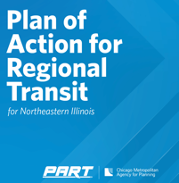
Eno’s contributions involved three critical steps: conducting interviews, preparing relevant case studies, and assessing potential governance reforms. We drew upon previous work that we had performed related to improving transportation governance in other cities including Chicago, Baltimore, Tampa, and Washington, D.C.
First, Eno conducted a series of interviews with transit stakeholders and identified key issues and potential recommendations. This work revealed how coordination could be improved between the three agencies that provide bus and rail service: the Chicago Transit Authority, Metra, and Pace. A fourth agency, the Regional Transportation Authority (RTA), is ostensibly responsible for coordination, but it has limited powers. As a result, the existing governance structure has resulted in problems relating to decision-making, service coordination, funding allocation, and accountability.

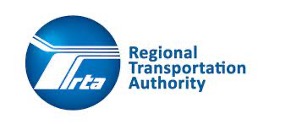
Puentes said, “You can’t overemphasize the importance of governance because it’s at the core of every transportation issue. We live in a rapidly changing world and the ability of agencies to respond to changing circumstances is shaped to a large extent by institutional and organizational structures. Governance determines who makes decisions and how they do so, and that directly effects whether or not transit agencies provide sufficient, effective and equitable services.”
After conducting interviews, Eno prepared case studies that looked at transit governance in New York, San Francisco, Seattle, Toronto, London, and Boston. Eno’s research has found that every approach to governance and transit funding reflects a combination of a region’s history, laws, growth patterns, geography, economic development, and other local circumstances. Nevertheless, the lessons from these six regions helped Eno and CMAP identify and evaluate options that could improve transit in the Chicago region.
Eno then identified and assessed potential governance reforms. We considered options that included minimizing RTA’s role, strengthening the RTA, and creating one consolidated agency that would be responsible for all transit services. Eno identified the advantages and disadvantages of each option, and also recommended legislative and policy changes that could help the region achieve its transit goals.
Eno recommended that the Illinois legislature move towards consolidating the Chicago area’s transit agencies in a way that maximizes benefits and minimizes risk. These recommendations were designed to help the region overcome the problems associated with a patchwork of agencies focusing on their own interests as they develop plans, undertake projects, and provide services. A new structure would help the Chicago region provide better transit service in a more efficient, accountable, and responsive manner.
“The Eno Center for Transportation was a critical thought partner throughout the Plan of Action for Regional Transit,” said CMAP Executive Director Erin Aleman. “Eno exposed our steering committee to international governance ideas, options, and best practices. Their expertise and research informed a range of local civic, business, academic, and labor leaders who helped guide the final report, which will support northeastern Illinois in investing in a stronger and more financially secure transit system.”
Clearly, governance alone cannot solve the massive operating shortfalls that the Chicago transit agencies are facing. That is why CMAP recommended that the state legislature consider a package of reforms including using state funds to fully fund paratransit operations, expanding the sales tax so that it would apply to services as well as products, and generating new revenues from tolling, parking, and vehicle registration.
Identifying the optimum governance structure and the right mix of funding sources will be a never-ending challenge. The region will need to be flexible as its needs change, opportunities arise, and institutions are transformed.
According to a statement released by CMAP: “Investing in a stronger and more financially secure transit system is critical to northeastern Illinois’ economy, health, and environment. The Eno Center for Transportation’s expertise and thought partnership supported the Chicago Metropolitan Agency for Planning in engaging the steering committee and conducting research for the Plan of Action for Regional Transit (PART). Eno’s research on international governance helped guide our steering committee –– comprised of local civic, business, academic, and labor leaders –– to develop PART’s big, bold solutions for securing the future of transit.”
Understanding Governance
One of the reasons why CMAP asked Eno for assistance in developing a plan is our extensive experience examining transportation governance issues. Below, you can read about some of our previous reports: (i) the link between transit governance and performance, (ii) recommendations for Austin’s newest transit agency, (iii) how to balance state and local interests in Maryland, (iv) benefits of consolidating Tampa’s metropolitan planning organizations, (v) highlights of a three-day governance workshop, and (vi) procurement of transit services in Washington, D.C.
Link between transit governance and performance
Eno’s “Getting to the Route of It: The Role of Governance in Regional Transit” report provides a resource for policy makers interested in understanding the transit governance structures of other regions, and improving the performance and customer experience of their own systems.
Eno partnered with TransitCenter to study six transit systems and the structures that govern them. The aim was to explore how different regional governance structures help foster—or hinder—the ability of transit agencies to deliver improved service, mobility, and innovation. This report summarizes the insights and conclusions drawn from the experience of the regions centered around Chicago, Boston, Dallas / Fort Worth, Minneapolis/St. Paul, New York, and the San Francisco Bay Area. Experience in each of the case study regions formed the basis for recommendations with the goal of creating unified regional networks, promoting effective funding decisions, and bolstering accountability.
Recommendations for Austin’s newest transit agency
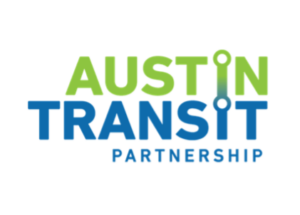
The Austin Transit Partnership (ATP), an independent local government corporation, was established after voters approved an ambitious transit expansion program in 2020. It will oversee the development of the city’s new light rail system while the Capital Metro transit agency operates the commuter rail and bus rapid transit system. Together, they are implementing Project Connect, a program that includes rail, bus, facilities, and technology improvements.
The ATP is governed by an independent board consisting of representatives from the City of Austin and Capital Metro. In 2021, the president of Capital Metro was appointed as ATP’s initial executive director and served jointly in both roles.
Eno was asked by ATP’s board to conduct a comprehensive and independent analysis evaluating the advantages and disadvantages of both joint and separate executive leadership as well as examining how those two options affect other critical aspects of governance and project delivery. Eno evaluated potential governance models for ATP and provided a roadmap for moving forward.
Eno’s community engagement efforts included interviews with key stakeholders and virtual town halls. Our researchers also examined six regions that have used special purpose delivery vehicles; these are entities created to oversee specific projects. Using the case studies and community engagement, Eno formulated best practices and observations about Project Connect’s governance issues. We explained how the Austin region needed a collaborative, transparent, and mutual understanding about ATP’s independence, and a clear decision about how autonomous it would be from Capital Metro.
Balancing state and local interests in Maryland
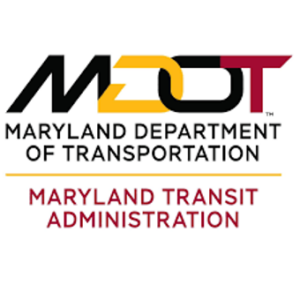
Eno’s 2020 report, “Transit Reform for Maryland: New Models for Accountability, Stability, and Equity” examined the existing system of transit governance in Central Maryland, and proposed recommendations for transit governance reform. Eno outlined key issues and developed its recommendations through a literature review and interviews with stakeholders. The research also included case studies of peer transit agencies, looking at their institutional models, funding mechanisms, and board structures.
Eno recommended that the state continue to have a role in transit funding and oversight; however, local leaders should be directly involved with the Metropolitan Transit Administration’s decision-making process since they are more aware of community needs. To have smoother transitions after every election cycle, Eno recommended that a board of directors be established with members serving staggered terms. Building on these elements, the report provided detailed options for reform that would most effectively balance the needs of local communities and the state.
Consolidating Tampa’s metropolitan planning organizations
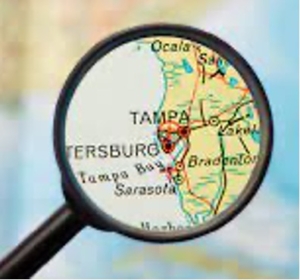
Eno’s 2017 report, “The Need for Regional Transportation Governance in Tampa Bay” helped leaders in the Tampa Bay / St. Petersburg / Clearwater area understand how moving to a regional structure for transportation planning, operations and decision making is the key to developing a regional transportation system and why it is one of the foundations of a strong economy.
The report recommended that the region’s leaders consolidate the multiple metropolitan planning organizations into one regional organization. Beyond the obvious benefit of taking a regional view, this would also enhance communications, improve forecasting and planning, take advantage of economies of scale, and consolidate duplicative efforts.
The existing county-based system was originally designed in 1970, but much has changed since then. The population has nearly tripled and about one-quarter of a million people commute to jobs outside their county. Based on Eno’s research, stronger metropolitan planning and capital programming processes across jurisdictional and modal lines are essential prerequisites to making better decisions on the investment of scarce public resources.
Highlights of a three-day governance workshop
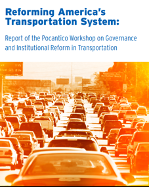
In, 2019, Eno and the Reason Foundation convened a three-day workshop that brought together scholars and executives with expertise in transportation policy, finance, operations, technology, and environment.
Attendees discussed the significant transformations associated with the emergence of automated and connected vehicles, the ubiquity of ride sharing, and the threat of climate change. They explored challenges to transportation governance and considered whether and how they could be addressed through institutional reform.
The discussions were exploratory and wide-ranging, and Eno’s report identifies significant issues, areas of common concern, and broad themes that emerged.
Procurement of transit services in Washington, D.C.
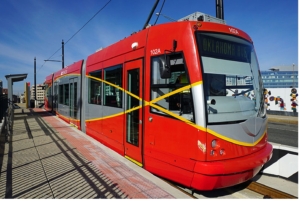
Photo courtesy of Mariordo (Mario Roberto Duran Ortiz), CC BY-SA 4.0 , via Wikimedia Commons
In 2019, Eno released its “Delivering Better Outcomes: Recommendations to Improve the Governance and Oversight of DC Circulator and Streetcar” report.
Eno evaluated two services managed by the city of Washington, D.C.: the DC Circulator’s six bus lines and the DC Streetcar’s rail line which runs along the H Street corridor. The city has entered into two separate contracts with one private company to operate them.
Eno evaluated alternative management structures and operational models for both services, including understanding how to improve the current model for potential future procurements. Analyzing the implications of transit governance and service delivery models involved in-depth conversations with stakeholders, experts, and those with knowledge of the regional system.
This report reviewed four feasible options for the Washington, D.C. government. Ultimately, Eno concluded that a continuation of the current model with proper oversight would best serve the city. Beyond that, we made recommendations that should be made to this governance structure, including legislating labor protections, following international best practices for contracting, and investing in an adequate bus maintenance facility.
Eno will continue reporting on efforts relating to governance reforms and the transit fiscal cliff.












